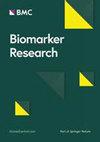肿瘤浸润调节性 T 细胞的脂质代谢:精准免疫疗法的视角
IF 9.5
2区 医学
Q1 MEDICINE, RESEARCH & EXPERIMENTAL
引用次数: 0
摘要
调节性 T 细胞(Tregs)对免疫系统的负调控至关重要,因为它们能避免过度炎症并介导肿瘤的发展。肿瘤组织中丰富的 Tregs 表明,可以消除或在功能上抑制 Tregs 以刺激抗肿瘤免疫。然而,针对 Tregs 的免疫疗法因 Tregs 的系统性消除而受到自身免疫性疾病的严重阻碍。最近,新出现的研究表明,代谢调节可以特异性地针对肿瘤浸润免疫细胞,TME 中的脂质积累与免疫抑制有关。然而,Tregs 如何主动调节代谢重编程以超越效应 T 细胞(Teffs),以及脂质代谢重编程如何促进 Tregs 的免疫调节能力,这些问题尚未得到充分讨论。本综述将讨论脂质积累赋予肿瘤浸润 Tregs(TI-Tregs)代谢优势并增强其免疫抑制功能的生理过程。此外,我们还将总结各种代谢调节因子对 Tregs 代谢重编程的驱动作用。最后,我们提出,针对 TI-Tregs 的脂质代谢可单独或与免疫检查点疗法结合使用。本文章由计算机程序翻译,如有差异,请以英文原文为准。
Lipid metabolism in tumor-infiltrating regulatory T cells: perspective to precision immunotherapy
Regulatory T cells (Tregs) are essential to the negative regulation of the immune system, as they avoid excessive inflammation and mediate tumor development. The abundance of Tregs in tumor tissues suggests that Tregs may be eliminated or functionally inhibited to stimulate antitumor immunity. However, immunotherapy targeting Tregs has been severely hampered by autoimmune diseases due to the systemic elimination of Tregs. Recently, emerging studies have shown that metabolic regulation can specifically target tumor-infiltrating immune cells, and lipid accumulation in TME is associated with immunosuppression. Nevertheless, how Tregs actively regulate metabolic reprogramming to outcompete effector T cells (Teffs), and how lipid metabolic reprogramming contributes to the immunomodulatory capacity of Tregs have not been fully discussed. This review will discuss the physiological processes by which lipid accumulation confers a metabolic advantage to tumor-infiltrating Tregs (TI-Tregs) and amplifies their immunosuppressive functions. Furthermore, we will provide a summary of the driving effects of various metabolic regulators on the metabolic reprogramming of Tregs. Finally, we propose that targeting the lipid metabolism of TI-Tregs could be efficacious either alone or in conjunction with immune checkpoint therapy.
求助全文
通过发布文献求助,成功后即可免费获取论文全文。
去求助
来源期刊

Biomarker Research
Biochemistry, Genetics and Molecular Biology-Molecular Medicine
CiteScore
15.80
自引率
1.80%
发文量
80
审稿时长
10 weeks
期刊介绍:
Biomarker Research, an open-access, peer-reviewed journal, covers all aspects of biomarker investigation. It seeks to publish original discoveries, novel concepts, commentaries, and reviews across various biomedical disciplines. The field of biomarker research has progressed significantly with the rise of personalized medicine and individual health. Biomarkers play a crucial role in drug discovery and development, as well as in disease diagnosis, treatment, prognosis, and prevention, particularly in the genome era.
 求助内容:
求助内容: 应助结果提醒方式:
应助结果提醒方式:


